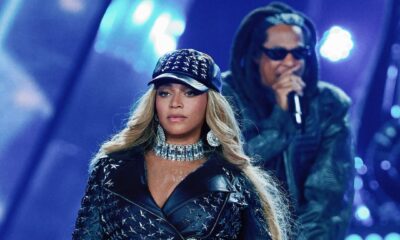Features
Mfonobong Inyang: It’s Time To Double Down On Our Cultural Exports!

Culture is a very powerful thing; it’s literally the way of life of a people. Its influence can be pervasive, whether for good or bad. When weaponised, its effects can be far-reaching. Advanced civilizations understand its potency and have used it to further their strategic interests. Sometimes referred to as soft power, they have influenced others far more by appeal and attraction than by coercion.
Didn’t you see how the world stood in awe during the coronation of the Olu of Warri, Ogiame Atuwatse III, Tsola Emiko? That was one of the biggest exhibitions of our rich heritage I have seen this year. The sad thing about culture is that if you don’t know its value, others will appropriate it for themselves. It’s now commonplace for people in the abroad to sample expressions of our culture like slangs, dance, songs, hairstyles, clothin, and so on. You will see someone about to release a project and, suddenly, he has just discovered that his ancestry has been traced to Nigeria. For them, it’s just like the front of the plane, it’s all business.
Agenda Will Always Agend
When powerful people, businesses and countries want to affect lifestyles, they infiltrate your sensibilities via culture. For example, in the hay days of the Roman Empire, the hegemony or superpower of the world at the time, they exerted their influence across territories (most of which were conquered) beyond ancient Rome. This ascendancy included ideological, socio-cultural, religious and economic norms. Most of what you know of other countries aren’t first-hand, you learnt them vicariously through their cultural touch points such as books, movies, music, media and so on. They sold you powerful narratives about themselves in the most subliminal ways. Propaganda for many countries is a well-oiled machinery. For us, it shouldn’t just be an electioneering tool, it should be deployed even more in corporate governance.
Clockwork
Our very own Ngozi Okonjo-Iweala graced the cover of TIME Magazine as one of the 100 Most Influential in 2021. We already know her pedigree because she has enough receipts to show. What I saw on that cover was also the leader of the ankara army; someone exporting not just a representative of our ingenuity but a cultural ambassador of our prints to the world! The operative words for me were “most influential,” I asked myself, how are we as a collective leveraging this exposure? What are we consciously selling to the world as a corporate entity?
You Don’t Know Big Wiz?
From the streets of Ojuelegba, the leader of Starboy FC has carried his city on his back all the way. It’s no news that the world is coming to terms with our sound, we’re doing numbers but even that doesn’t do justice to the fact that our music is a certified staple in the global market. Machala’s album dropped, two seconds, everything don burst o! GQ described Wizkid as, “the guy Drake and Beyoncé call up when they need a continent-spanning smash hit.” Superstar no do pass like this. Made In Lagos didn’t just give us the song of the summer, it’s taking over international music charts. Normally, MIL na Grammy material.
Oya Comot Body Jor!
When it comes to dancing, fi le fun Poco! Poco Lee’s legwork has gone many kilometres from the streets of Ojo to the world. Young people with such abilities now see their dreams being personified by someone like them who reminds them that it can be done. A decade ago, most parents wouldn’t have entertained a conversation about their children taking on a career path that wasn’t amongst the so called prestigious disciplines. Today, young people like Poco Lee have shown that moving your body is a profitable activity that can be scaled up and exported.
E Shock You?
Our spontaneity especially with humour is unmatched, you just have to go on the timeline and see how creative we are in coming up with cruise content. Over the past few weeks, I have seen Broda Shaggi go on a tour of some African countries and beyond owing to the demand for his craft. Few years ago, this may have been far-fetched but today young people like Broda Shaggi have packaged his brand of comedy and taken it to the marketplace in exchange for value. In today’s generation of social media, jokes are very expensive – little wonder most content creators are laughing to the bank.
Ewweeee!
Name a more iconic duo than Osita Iheme and Chinedu Ikedieze that have dominated the blogosphere in terms of memes – I‘ll wait. If these meme lords got a dollar for every time their images were used as memes, they would be on top of Forbes list. From their days as Aki and Paw Paw, their vintage Nollywood clips have continued to gain notoriety even beyond our shores, and there is an overwhelming demand for their encores. If you are like me that wait to see the end credits of movies, you will agree that most box office movies abroad always have the government of the region in which the movie was produced as collaborators. These people know the power of storytelling and they exploit it accordingly, why can’t we do the same?
The Obi Cubana Business Model
Instead of majoring in the minor, we should be studying how savvy business magnates like Okpataozuora have built a vast lifestyle and hospital business to enviable heights. What are the franchising deals that he has learnt to negotiate? How did he build a viable leadership pipeline such that his organisation can run with little or no interference from him? Can we distil his PESTEL analysis and use it to mentor young business owners? If we can fix security, urban planning, transportation, food prices, aesthetics and other variables in the hospitality and tourism business model, can you imagine how much FX we could earn?
Siuuu!
After Cristiano Ronaldo made a storied return to Manchester United, the dividends the Red Devils were expecting to get had more implications off the field than on it. This is because football isn’t just a sport, it’s a business. Not only did their social media following increase by the millions, the CR7 shirt generated $60 million in 12 hours, the club’s share-price jumped too. Now you see why most Nigerians were triggered by the outcome of our Tokyo 2020 Olympics outing, because aside from the economy around it, it’s one of the things that engage young people and foster national unity. However, it’s great to see corporate Nigeria understanding the assignment and warming up to our sports teams.
Great leaders have used sports as a veritable tool for social engineering. Nelson Mandela, in trying to rebuild a post-apartheid South Africa, gave one of his most powerful speeches at a Rugby game, used his influence to push for the hosting of Africa’s first and only Men’s Football World Cup. One of the ways President Paul Kagame of Rwanda is selling his country, that once suffered a devastating civil war, as an investment destination is by placing the Visit Rwanda on the shirts of Arsenal FC, thereby targeting the right eyeballs. Few weeks after 9/11, President George Bush was at a Yankees’ game to throw out the ceremonial first pitch. That World Series became a rallying point for a hurting nation.
The Most Incredible, Out Of Naija!
No be lie, some of these examples I have cited just go to show that we can move away from a monocultural economy into multi-faceted economy if we truly have the will to do the right things, because the future will be driven by intangibles. We have to be au fait with the fact that the world is going green, so it’s not a smart play to keep putting money in oil like akara. This splitting of hairs over money will become more pronounced as we continue so we may as well start smarten up to the realisation of the potential of the creative economy. When next you see a Made In Nigeria symbol on a product, just know that we’re not just selling a nice commodity, we’re really exporting our culture. Make we talk am as we see am, no be say we go use sugar cover am. Let’s do this for the culture, literally.




















